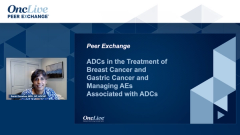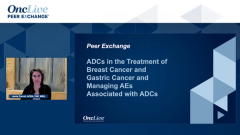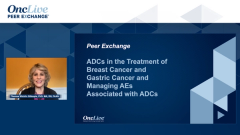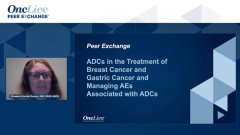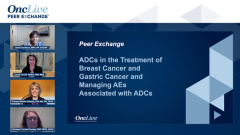
Management of Interstitial Lung Disease Related to T-DXd in Breast or Gastric Cancers
Focused conversation on the occurrence of interstitial lung disease in patients on antibody drug conjugate therapy for breast or gastric cancers.
Episodes in this series

Transcript:
Sarah Donahue, MPH, NP, AOCNP: How common is this risk of interstitial lung disease [ILD]? Do we know the percentages? I think the earlier trials showed that it was higher; initially when we started giving trastuzumab deruxtecan, I felt really anxious about interstitial lung disease and pneumonitis. At any whisper of shortness of breath or cough, I was ordering CT scans of the chest immediately. I was even, with some patients with breast cancer, having them do their scans every 2 months rather than every 3 months. I don’t know how often you’re scanning people who have gastric cancer, but it was really making me nervous. But the more recent data have shown that it’s less common than we thought, or it’s less detrimental, meaning the sequelae are less because it maybe is being treated sooner with steroids; I’m not sure.
Theresa Wicklin Gillespie, PhD, MA, RN, FAAN: I think one of the interesting things about gastric cancer and the trials that they’ve done is that the initial trial, DESTINY-Gastric01, was done in Japan and Korea, and we know that globally gastric cancer is not rare. It’s No. 5 in terms of incidence and No. 4 in terms of mortality, and it’s particularly prevalent in East Asia. They had a 10% rate of interstitial lung disease and pneumonitis in that population, particularly at the Japan sites. That was not seen when they went to Western populations in Europe and the United States. So, there may be something very distinct about that population, but fortunately, that has not been seen, at least in the trials that have been done. Of course, we have several that are ongoing.
Jamie Carroll, APRN, CNP, MSN: Even though we’re not seeing the percentages that we initially were fearful of, I still counsel my patients about letting us know if there’s any shortness of breath, any exertional dyspnea, “If you have any chest pain, any tightness, please let us know.” I think a lot of times patients are afraid to tell us about symptoms because they know that we’re the gatekeepers for their treatment, and they just don’t want to let us know. Or they might brush it off, they might say, “I’ve got a little shortness of breath, but I walked up some stairs.” And so, they don’t tell us. So, I think it’s really important when we’re giving these treatments to our patients that we’re giving them the education and letting them know that they have to tell us when they develop new symptoms, either through the portal or let us know when they come in for treatment.
Theresa Wicklin Gillespie, PhD, MA, RN, FAAN: I think that’s all excellent and applicable. The problem, and you’ll hear this in the case I’m presenting, is when you have someone with metastatic disease to the lungs, they already have respiratory symptoms. Then you get into issues of, “Well, this is just a cough that I already had,” or “This is the respiratory symptom that I already had.” It does cause a great deal of anxiety when patients do have other pulmonary symptoms or already are at risk for more serious adverse events. There’s a lot of back and forth, a lot of patient education as you mentioned, and hopefully you can stay on top of that.
Sarah Donahue, MPH, NP, AOCNP: Are you finding that you’re getting pulmonary specialists involved often in your patients to help differentiate what’s going on in their lungs, from metastases to interstitial lung disease?
Theresa Wicklin Gillespie, PhD, MA, RN, FAAN: Liz, I don’t know if you wanted to address that as well. We absolutely get pulmonary consultation very early, and of course, if they already have lung metastases, they’re probably already involved.
Elizabeth Prechtel Dunphy, DNP, CRNP, AOCN: Yes, I agree. We will get some imaging there when we see the patients initially, but then getting the pulmonary team on board is critical. I think trying to make your assessment seem not as scary to the patient, when you’re doing your review assistance with them to continue to ask about their breathing, their cough, dyspnea, makes it less scary, so that if they were to answer “yes” to the question, they wouldn’t be afraid to report that. Doing that on a consistent basis, I think, helps with the communication with the patient and also the patient reporting.
Sarah Donahue, MPH, NP, AOCNP: The package insert for trastuzumab deruxtecan says that if the patient has symptomatic ILD, you are supposed to discontinue the medication altogether. Are you finding that you’re doing that in your practice? I don’t know if you’ve had very many patients as an example for this, or are you deciding based on how severe the symptoms are? That’s addressed to everyone.
Jamie Carroll, APRN, CNP, MSN: Thankfully, I haven’t had any patients who have developed interstitial lung disease on this medication, so I haven’t had to discontinue it due to that.
Elizabeth Prechtel Dunphy, DNP, CRNP, AOCN: I’m thinking of a patient we just saw this week: he is asymptomatic but had some changes on his chest imaging, so, we’re being very cautious with monitoring. We haven’t had to move forward with holding treatment or making adjustments or intervening right at this point. But we’re monitoring him very closely and checking in on him on the weeks off of treatment just to make sure nothing’s changed.
Theresa Wicklin Gillespie, PhD, MA, RN, FAAN: We also have not had any patients documented with ILD. But likely, we would follow the safety precautions.
Sarah Donahue, MPH, NP, AOCNP: We haven’t had anybody with symptomatic ILD. That’s more than just a slight shortness of breath, I suppose. So, I would say we haven’t had anybody with symptomatic ILD, and we have been able to continue the treatment once they’re on their steroids and they’re able to taper a bit. Timing of when to restart is always questionable, but as long as they’re feeling better; we’ll do a CT scan of the chest maybe a few weeks later, like I had in my case, to make sure that it’s going in the right direction before we restart.
Transcript edited for clarity.
Newsletter
Knowledge is power. Don’t miss the most recent breakthroughs in cancer care.

